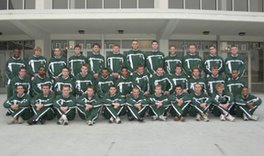If I told you I earned $250,000 per year (unfortunately I don’t), you might be impressed. But if you found that I was spending $300,000 per year in my house¬hold budget (fortunately I’m not), you would quickly realize that I had a problem. That problem is called a deficit. Regard¬less of how impressive my income might be, the real bottom line of my finances is income minus expenses. When expenses exceed income, a deficit occurs.
I appreciate Nate Saum pointing out in his letter on April 9 the huge sums of money that OU football brings in for play¬ing many of their games. To earn $500,000 for one game is certainly impressive! But Nate, what is the real bottom line? Income is only half of the equation. Can you ignore what the football team spends or costs the university each year? It’s easy to bring in millions and still have a gigantic deficit — just spend more than you bring in.
I need to say here that I am not opposed to OU football in any way. I am not even opposed to OU football losing millions of dollars each year. In fact, I am not even opposed, in principle, to the university ceasing to fund other things in order to fund a sport that, on the surface anyway, is losing money. If the univer¬sity benefits from having an impressive football team (no doubt this matters to alumni and impacts their giving), then make the responsible and rational cuts you need in order to support the football program. But be honest!
If you are directing funds to football because the university benefits in some tangible or intangible way, then don’t say “Title IX made me do it.” No, you chose to do it. When pressured at the Feb. 15 Board of Trustees meeting to divulge the real reasons for the elimination of four OU sports, Athletic Director Hocutt took a step toward honesty when he said “there are financial savings and investments in cutting these other sports. The university has decided to strategically invest in oth¬er sports.” Why wouldn’t he admit that on Jan. 24 when the original announcement was made?
Nate suggested that I do some more digging to find the real culprit. How about digging into the May 25, 2006, OU Internal Audit, Review of Intercollegiate Athletics? It states that fiscal misman¬agement in the athletic department “has resulted in ICA exceeding its budget in recent years and accumulating a deficit that must be repaid to the university. The debt includes operating deficits of more than $1 million from both FY05 and FY06 (projected), capital debt from the Peden Stadium renovations and from the lower¬ing of the football field.”
I could drag out many similar quotes from this document and other pub¬lic documents, but would rather sum¬marize by quoting former OU track and cross country coach Elmore Banton in his Feb. 5 article in The Post: “According to the last year’s NCAA report, Ohio Uni¬versity spends $491 per track athlete per year, $10,000 per football athlete per year and $22,000 per basketball athlete per year.” He goes on to say, “in addition, the Ohio University football program had a $1.9 million deficit and basketball had a $331,000 deficit last year. To anyone look¬ing at these figures, it might appear that we are attacking the wrong animals. The cows have gotten too big for the barn, so we are throwing out the chickens instead of putting the cows on a diet.” I want to meet Coach Banton someday — he’s got a way with words!

In my profession I have the privilege of counseling people regarding their per¬sonal finances. When someone’s expens¬es exceed their income, I advise them that they need to either raise income or cut expenses. Cutting expenses is almost always the easier route. But when they ask me if they can just stop making their car payments, credit card payments or the payments on their big screen TV, I have to remind them that those are obliga¬tions they took on willingly. Their budget cuts will have to come in other catego¬ries, like cutting down on their grocer¬ies or moving to a cheaper apartment. Integrity demands that you honor your obligations, even when it’s uncomfort¬able or inconvenient. Ohio University’s athletic department entered into an obli¬gation to swimmers, lacrosse players and track athletes when it recruited them and signed them to compete for OU. Budget cuts need to be made; but commitments need to be honored. OU could honor its commitment to these athletes by allowing their sports to phase out during the next three years. Meanwhile, make responsible budget cuts somewhere else — or maybe just do as Coach Banton suggests and put the cows on a diet.
Honesty and integrity. Recurring themes that Nate has probably noticed in the “letter after letter” he has read on this issue. I hope lots of people have noticed. I’m still hopeful that President McDavis and Athletic Director Hocutt will take heed. They do read The Post, don’t they?
Greg Sargent writes from Mason, Ohio, and is a
member of United Swim Parents.




















No comments:
Post a Comment